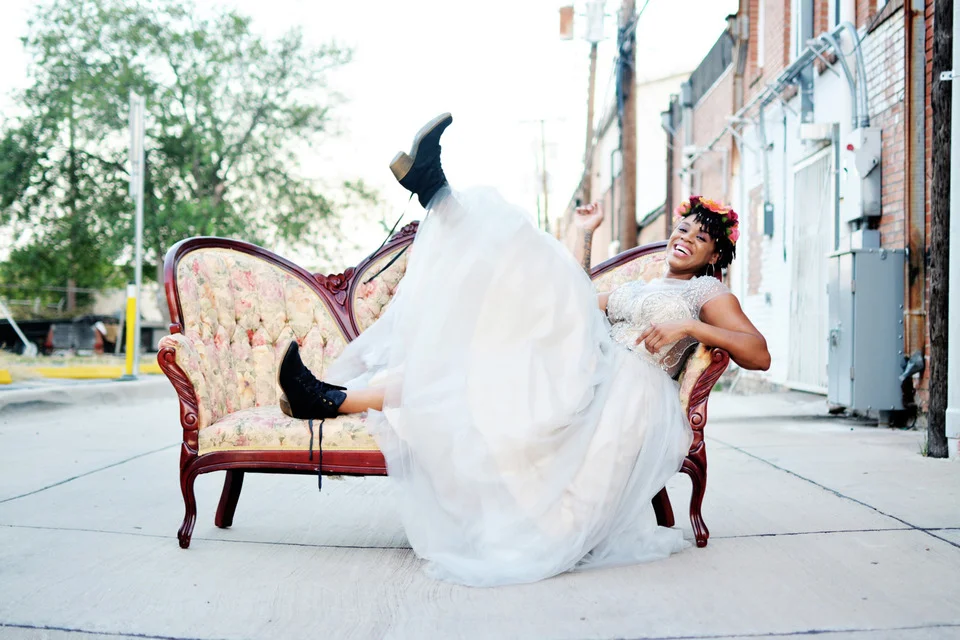1. In 140 characters or less, tell us what you do?
I'm a social justice educator that uses activism as a tool for delivering content. I also work with my husband as a tutor and direct youth programs.
2. What 3 words would you use to describe your career?
Fluid, Prismatic, Rewarding
3. Did you always know this is what you’d be doing?
I always knew I would do something that involved the community, arts and children. I didn't have the specifics about how that would look, but most of my volunteer opportunities and internships involved some aspect of the three. I have been drawn to positions not so much because of the titles, but due to the ways that the positions could serve my overall vision for my career and life goals.
4. What’s your big “why”? Why do you do what you do?
I do what I do because I think it's important to create spaces that affirm all kinds of people. Children learn from a very young age what kinds of words, actions and appearances excel and are most beneficial. I enjoy interrupting the narrative of "good" and "bad" students and look more at the social implications that may cause certain behaviors. There are plenty of adults with similar mindsets that work in youth development, but I think that we can easily become burnt out and depleted doing such powerful work on a daily basis. I educate, tutor and mentor to be a voice of social change and allow my students, clients and colleagues to see that balance is healthy. I openly discuss spending time with my husband and children or ways that I celebrate professional accomplishments. I do what I do to demonstrate that serving children and families is sustainable with the proper support, balance and self care.
5. Tell us a little bit about your career journey?
After graduating from Spelman College with a degree in English and Creative Writing, I attended Tufts University for a Masters Degree in Education. I completed my student teaching at an Independent School and realized that there were all kinds of spaces that I may not have considered that could use my presence. My husband and I relocated to Washington, DC ten years ago and I took a year off to be home with our daughter. I started my career at a charter school in DC and taught fifth grade. After 3 years, I took more time off to be with my second child and worked at another charter school as a special education teacher and reading interventionist. I loved the school and environment, but received the opportunity to enter the DC Public School system and wanted to diversify my experience and bring my special education knowledge to the general education environment. This is my second year with DC Public Schools and I absolutely love the ways that my previous experiences have been working in my favor!
6. What’s a typical day like for you?
A typical day for me starts with praying with my husband. It helps us to set the tone for the day and reminds me of what's important despite how busy the day will get. After getting my 6 year old son and 10 year old daughter ready for school, I go to my school located in the Capitol Hill area of DC. I have planning time in the morning and my students start their day with a community meeting. I teach writing and math in the morning and have an hour of planning in the middle of the day. I use this time to look ahead to coming days and weeks as well as put in any copy requests. I end my day teaching reading and social studies and have 45 minutes of planning time. My husband and I run an after school enrichment program at my school and he brings our children to participate. I work with students for an hour of math practice and he leads the second hour of sports and team building activities. It's a pretty long yet rewarding day and working alongside my husband while having my children present is invaluable.
7. What advice would you give to women who have not yet found their purpose or are unsure what they want to do in their career?
I wrote a poem for my high school graduating class called Barefoot Dreams. It was about pursuing your raw and unprotected dreams and goals despite hardship. In terms of women struggling with their career goals or purpose, I would say to follow your passion. The Meyers Briggs interest inventory helped me to think about the kinds of careers that would benefit my personality and passions. I was able to articulate why I would be a good fit for organizations early in my career. Eventually my personal brand became well known at other schools and organizations and I was able to take my pick of beneficial positions. I would start with investing in your passions and interests. Next, learn to communicate those passions and interests as marketable skills. Never underestimate your contribution to the world!


















